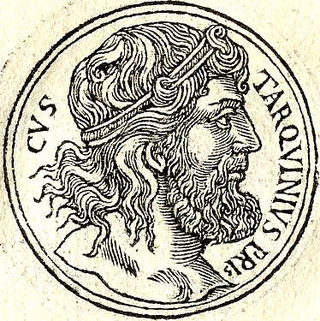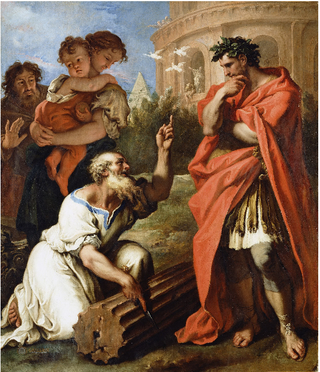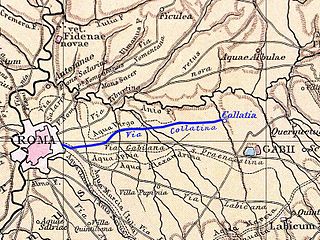Related Research Articles

Lucius Tarquinius Priscus, or Tarquin the Elder, was the legendary fifth king of Rome and first of its Etruscan dynasty. He reigned for thirty-eight years. Tarquinius expanded Roman power through military conquest and grand architectural constructions. His wife was the prophetess Tanaquil.

Lucius Tarquinius Superbus was the legendary seventh and final king of Rome, reigning 25 years until the popular uprising that led to the establishment of the Roman Republic. He is commonly known as Tarquin the Proud, from his cognomen Superbus.

According to Roman tradition, Lucretia, anglicized as Lucrece, was a noblewoman in ancient Rome. Sextus Tarquinius (Tarquin) raped her and her subsequent suicide precipitated a rebellion that overthrew the Roman monarchy and led to the transition of Roman government from a kingdom to a republic. After Tarquin raped Lucretia, flames of dissatisfaction were kindled over the tyrannical methods of Tarquin's father, Lucius Tarquinius Superbus, the last king of Rome. As a result, the prominent families instituted a republic, drove the extensive royal family of Tarquin from Rome, and successfully defended the republic against attempted Etruscan and Latin intervention.

Lucius Junius Brutus was the semi-legendary founder of the Roman Republic, and traditionally one of its first consuls in 509 BC. He was reputedly responsible for the expulsion of his uncle the Roman king Tarquinius Superbus after the suicide of Lucretia, which led to the overthrow of the Roman monarchy. He was involved in the abdication of fellow consul Tarquinius Collatinus, and executed two of his sons for plotting the restoration of the Tarquins.
The gens Tullia was a family at ancient Rome, with both patrician and plebeian branches. The first of this gens to obtain the consulship was Manius Tullius Longus in 500 BC, but the most illustrious of the family was Marcus Tullius Cicero, the statesman, orator, and scholar of the first century BC. The earliest of the Tullii who appear in history were patrician, but all of the Tullii mentioned in later times were plebeian, and some of them were descended from freedmen. The English form Tully, often found in older works, especially in reference to Cicero, is now considered antiquated.

Tanaquil was the queen of Rome by marriage to Tarquinius Priscus, the fifth King of Rome.

In Roman religion, Terminus was the god who protected boundary markers; his name was the Latin word for such a marker. Sacrifices were performed to sanctify each boundary stone, and landowners celebrated a festival called the "Terminalia" in Terminus' honor each year on February 23. The Temple of Jupiter Optimus Maximus on the Capitoline Hill was thought to have been built over a shrine to Terminus, and he was occasionally identified as an aspect of Jupiter under the name "Jupiter Terminalis".

Tarquinia, formerly Corneto, is an old city in the province of Viterbo, Lazio, Central Italy, known chiefly for its ancient Etruscan tombs in the widespread necropoleis, or cemeteries, for which it was awarded UNESCO World Heritage status.

Publius Valerius Poplicola or Publicola was one of four Roman aristocrats who led the overthrow of the monarchy, and became a Roman consul, the colleague of Lucius Junius Brutus in 509 BC, traditionally considered the first year of the Roman Republic.
Arruns Tarquinius was one of the sons of Lucius Tarquinius Superbus, the last King of Rome. Ancient sources differ as to whether he was the second or third son. In the earliest accounts, passed through fragments of the first Roman historian, Fabius Pictor, he is the third son. According to Livy and Dionysius of Halicarnassus, he is the second son. Modern historians doubt the historicity of the specific actions attributed to Arruns and other members of his dynasty, regarding them as highly embellished by later accounts.

The gens Tarquinia was a plebeian family at ancient Rome, usually associated with Lucius Tarquinius Priscus and Lucius Tarquinius Superbus, the fifth and seventh Kings of Rome. Most of the Tarquinii who appear in history are connected in some way with this dynasty, but a few appear during the later Republic, and others from inscriptions, some dating as late as the fourth century AD.
Gaius Papirius was pontifex maximus in 509 BC, the first year of the Roman Republic. He copied the religious ordinances established by Numa Pompilius, the second King of Rome, which his grandson, Ancus Marcius, had carved on oaken tablets, and placed in the Forum.

Collatia was an ancient town of central Italy, c. 15 km northeast of Rome by the Via Collatina.
Demaratus, frequently called Demaratus of Corinth, was the father of Lucius Tarquinius Priscus, the fifth King of Rome, the grandfather or great-grandfather of Lucius Tarquinius Superbus, the seventh and last Roman king, and an ancestor of Lucius Junius Brutus and Lucius Tarquinius Collatinus, the first consuls of the Roman Republic.

Lucius Tarquinius Ar. f. Ar. n. Collatinus was one of the first two consuls of the Roman Republic in 509 BC, together with Lucius Junius Brutus. The two men had led the revolution which overthrew the Roman monarchy. He was forced to resign his office and go into exile as a result of the hatred he had helped engender in the people against the former ruling house.

Arruns Tarquinius, commonly called Egerius, was a member of the royal family of early Rome.
The gens Pinaria was one of the most ancient patrician families at Rome. According to tradition, the gens originated long before the founding of the city. The Pinarii are mentioned under the kings, and members of this gens attained the highest offices of the Roman state soon after the establishment of the Republic, beginning with Publius Pinarius Mamercinus Rufus, consul in 489 BC.

The gens Postumia was a noble patrician family at ancient Rome. Throughout the history of the Republic, the Postumii frequently occupied the chief magistracies of the Roman state, beginning with Publius Postumius Tubertus, consul in 505 BC, the fifth year of the Republic. Although like much of the old Roman aristocracy, the Postumii faded for a time into obscurity under the Empire, individuals bearing the name of Postumius again filled a number of important offices from the second century AD to the end of the Western Empire.
Regillum or Inregillum was a town in ancient Sabinum, north of Rome, known chiefly as the original home of Appius Claudius Sabinus Regillensis.
Publius Servilius Priscus was a Roman senator active in the fifth century BC and consul in 463 BC.
References
- ↑ Livy, i. 34.
- ↑ Dionysius, iii. 46, 47.
- 1 2 3 4 Dictionary of Greek and Roman Biography and Mythology, vol. III, pp. 976, 977 ("Tarquinius").
- ↑ Livy, i. 34, 35.
- ↑ Dionysius, iii. 47–49.
- ↑ Livy, i. 38.
- ↑ Dionysius, iii. 50.
- ↑ Livy, i. 57–60.
- ↑ Dionysius, iv. 64, 76.
- ↑ Ovid, Fasti, ii. 725 ff.
- ↑ Chisholm, Hugh, ed. (1911). . Encyclopædia Britannica . Vol. 26 (11th ed.). Cambridge University Press. pp. 430–431.